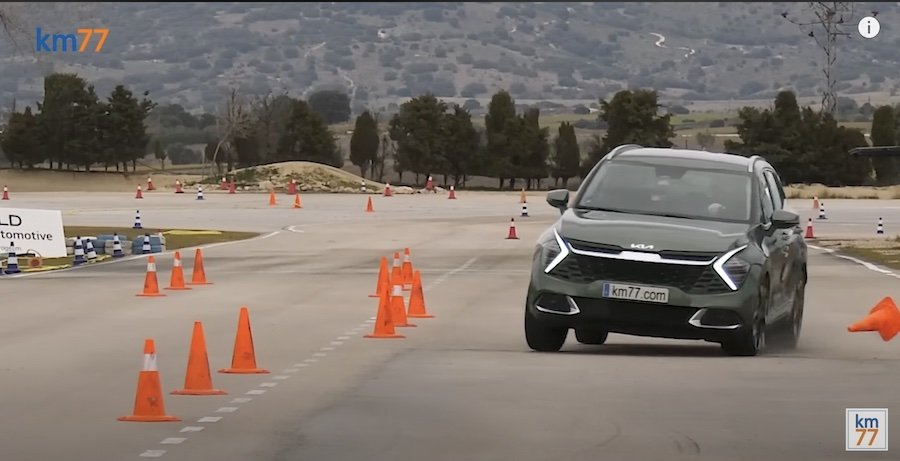See 2023 Kia Sportage PHEV Struggle With Speed In A Surprising Moose Test

The fifth-generation Kia Sportage is new in North America for the 2023 model year, and it's a sharp-looking SUV compared to its predecessor. Available with a plug-in hybrid powertrain that offers 261 horsepower with all-wheel drive, it's not exactly a slow-moving people mover either. But how does the Sportage handle that power and panache in emergency situations?
That, of course, is the whole point of the moose test and we've been watching Km77.com for years on such things. The new Sportage is the latest vehicle to tackle the coned course, and if there's a measure of familiarity with all this, you're not going crazy. The Hyundai Tucson PHEV went through the same test just a few weeks prior, and it uses the same chassis/powertrain setup – specifically a turbocharged 1.6-liter four-cylinder and a single electric motor. That power goes through a six-speed automatic transmission to all four wheels. In fact, the video notes that even the tires (Michelin Primacys) between the two are the same.
As such, logic suggests the Sportage PHEV would post the same result. That's especially true considering it was tested on the same day as its Hyundai cousin, and for the slalom portion of the exam, that's exactly what happens. It returns a total time through the cones at 24 seconds flat, a dead match to the Tucson right down to the tenth. The Kia was said to be stable and predictable, willing to follow steering inputs and change direction as needed. If anything, it felt a bit better than the Tucson in the slalom.
The same cannot be said for the moose test.
In its first attempt at the target speed of 48 mph (77 kph), the Sportage PHEV is, in a word, messy. Cones are struck at every phase of the emergency lane-change maneuver, with multiple cones flattened at the end as the SUV bounces its backside into them. That said, the Sportage reportedly felt stable ... it just couldn't clear the cones.
Here's where it gets surprising. The Tucson's best speed in the test was 74 kph (46 mph), but The Sportage couldn't pass at that point, either. Considerable understeer sent multiple cones flying midway through the maneuver, and the driver was simply unable to complete the final turn of the test. In fact, the best speed for the Kia was a low 71 kph (44 mph).
As for why, the Km77 team couldn't identify anything specific. Both vehicles felt the same behind the wheel, with the Tucson arguably being a bit more agile. Ultimately, each was deemed stable and confident in terms of responses, though the Sportage's moose test performance was deemed poor.
Related News


